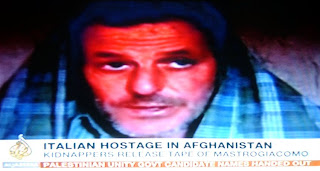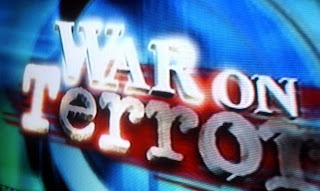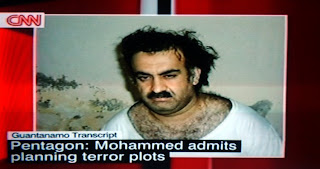
Confusion and disputes persist over where the sailors were captured
Seven days after fifteen British navy personnel were taken captive by Iranian authorities; Britain is no further forward in negotiating their release. Last week, according to initial reports, inflatable boats had been dispatched to investigate smuggling operations ‘in Iraqi waters’. A dispute occurred as to whether the navy personnel had breached Iranian waters and 15 British navy personnel were taken prisoner by the Iranian Revolutionary Guard. Since then there have been punctuated statements coming from Iran and Britain, each condemning the other. Over the week there have been strong denials by British authorities that the sailors breached Iranian waters. On Saturday the UN were discussing sanctions against Iran over their continued Uranium enrichment. Meanwhile reports indicated the captured servicemen had been moved to Tehran. Iran said the 14 men and one woman had admitted to straying into Iranian waters.
On Sunday, Tony Blair weighed in with a strong denial as to the veracity of Iranian claims. “There is no doubt at all that these people were taken from a boat in Iraqi waters, it is simply not true that they went into Iranian territorial waters” the Prime Minister said.
On Monday the Iraqi foreign minister added to the diplomatic pressure, saying that the sailors were in Iraqi waters and should be released immediately. Meanwhile the British ambassador in Tehran waited for the most basic of information, such as their location and welfare. Des Browne MP, the Defence Secretary, speaking in Parliament said the government was “doing everything possible to secure their release”. The Iranian Foreign Minister Manouchehr Mottaki speaking at the UN said there were “two options”. The first, he said would be “a diplomatic solution”, but he warned “the second option would be confrontation”.
Tuesday saw Britain’s Foreign Secretary in Ankara Turkey where she said she hoped to “see this matter resolved swiftly and peacefully, and I hope that can happen soon”. She said the Iranian government had not made clear where the sailors were being detained. Asked whether she feared they might be charged with spying Margaret Becket re-emphasized that the British naval personnel were operating in Iraqi waters under a UN mandate. Both Sky and the BBC showed Live coverage of her visit to the country, but while the BBC cut away during the question and answer session, Sky News continued with their extensive coverage. Besides a hope for a swift and peaceful resolving of the crisis, British Prime Minister Tony Blair had earlier suggested that ‘diplomacy’ may move into “a different phase” if the 14 men and 1 woman were not released soon. He spoke on a morning television news programme, GMTV.
The Iranian Deputy Foreign Minister was later shown on CNN saying that the navy personnel were captured in Iranian waters and were being questioned. Mahdi Mustafavi said, “it needs to be established whether this aggression was calculated or unintentional, either way this was an act of aggression. They entered the designated area of our country”. The European Union Foreign Policy Chief Javier Solana, meanwhile stood in support of Britain’s stance.
By Wednesday Sky News said the situation “was likely to intensify” with both sides in the dispute disagreeing as to where the navy personnel were at the time of their capture. While the EU and Iraq had already made statements protesting the service personnel’s detention, the United States were somewhat guarded. Senior US State Department Official, Ambassador Nicholas Burns was quoted as saying it would no be “useful for the United States to say much about this” and to leave the matter in the hands of the British Government. But Sky News hinted at where a ‘different phase’ might lead. The news channel showed the latest arrival of a US aircraft carrier fleet in the Gulf as part of the increased pressure over Iran’s nuclear policy. Tim Marshall, Sky’s International Affairs correspondent said “it serves as a reminder that if you go to a different phase, there are phases beyond that”.
Later in the day the British authorities stepped up the war on words. Margaret Beckett speaking in the House of Commons said the Iranians had supplied two sets of contradictory coordinates of where the capture took place. Neither were correct, she said, and the government had released their own data to show where the naval personnel had been operating. “I regret to say that the Iranian authorities have failed to meet any of our demands, or responded to our desire to resolve this issue quickly and quietly with behind-the-scenes diplomacy”, she said to a packed House. She said that the statement and data had been released in order to “set the record straight”. Earlier, Deputy Chief of Defence Staff, Vice Admiral Charles Style, CBE, made a statement in which he said the personnel from the HMS Cornwall were acting out their lawful duty in Iraqi waters and that the capture and detention was “unjustified and wrong”. The ‘different phase’ was emerging in the form of a freeze on business with Iran and a block on all new visas issued to officials.
Iran continued to insist that a border violation took place and that “geographical coordinates of the detention” had been provided to the British Government, “including GPS navigator systems, to indicate the penetration of British military personnel 0.5 km deep into Iranian waters”. The statement said that whilst the “investigation continued”, the captured sailors remained “in good health and they enjoy the welfare and Iranian hospitality”.
All the political manoeuvring did little to stop the British naval manoeuvres which continued in the area in an attempt to thwart the smuggling of weapons into Iraq where the insurgency continues. Wednesday in Iraq proved to be another deadly day with at least 30 dead in sectarian reprisal attacks in Tal Afar in northern Iraq. Shia gunmen were said to have attacked Sunnis in the city in retaliation for two truck bomb attacks the previous day. CNN said dozens were killed in those attacks.
This Week, the BBC flagship for political affairs, led with the Iranian hostage crisis and said that “what could have been just a minor diplomatic incident could now be in the process of becoming a much wider and more dangerous picture”. Former hostage and Middle East correspondent, Charles Glass, gave his perspective and experience of being captured and detained. He was captured by Hezbollah in Lebanon in 1987. Glass said he and many others were “pawns in a game between Iran and the West” and the sailors currently being held in Tehran were in the same predicament. He pointed in particular to a stand-off between Iran and the US over the detention by a number of Iranian officials ‘captured’ in Erbil in northern Iraq. Iran has already suggested that a ‘swap’ may be part of any deal to release the hostages. But the US is unlikely to bend to any pressure to release the men they currently hold incommunicado. He said that events such as the current hostage crisis were “inevitable” because “they are a part of a much bigger strategic game”. He also suggested it “may be better to allow Iran to have the bomb than to go to war with Iran”. A war he said would alienate the Iranian people further from the West, as well as increasing Iranian state-sponsored terrorism. Additionally, he cited the position of Pakistan, which has been allowed to develop a nuclear weapon despite being “more unstable” than Iran.
In a studio debate, Charles Glass said the Iranians were particularly sensitive to reports that the US were conducting surveillance operations in Iranian waters in preparation for an American bombardment.
The day’s news also saw the release of footage showing one of the captured service personnel. Leading Seaman Faye Turney was shown on an Iranian satellite news channel in a so-called confession. In footage shown on Alalam she said, “Obviously we trespassed into their [the Iranian’s] waters” but she said they were being treated well. “They explained to us why we’ve been arrested; there was no harm, no aggression” she added. The video was sharply condemned by British government officials. A statement from the Foreign Office described the video as “completely unacceptable” and said it had “grave concerns”.
At the United Nations the Members of the Council also expressed “grave concern” but stopped short of any UN resolution. The UN said it could not “independently verify” the veracity of the claims of where the people were captured. In the demand for the hostages’ release the UN statement dropped the word ‘immediate’ after pressure from Russia who said it would not be ‘helpful’. Criticism was shown to be building from other neighbours close to Iran. On Sky News, a former Israeli security advisor, Uzi Dayan, said “Mahmoud Ahmedinejad has to be stopped one way or another”. He said a nuclear Iran would pose a threat “not only to Israel and the Middle East but also the free world.” Israel may also be pushed into taking action themselves against Iran’s nuclear ambitions. In 1981 the Israeli airforce bombed and destroyed a nuclear power station in Osirak in Iraq. There may be further strains to the political situation in the region after the Saudi King spoke out against what he called an “illegitimate” occupation in Iraq. During the address at an Arab summit in Riyaad he said, “in our beloved Iraq our brothers’ blood is shed in the shadow of illegitimate foreign occupation, and the repulsive sectarianism threatens civil war”. Nicholas Burns, the US Under-secretary of State said he was “a little surprised to see those remarks”. The Saudi King also recently snubbed the US by cancelling a visit and angered them further by welcoming Mahmoud Ahmedinejad to the Saudi Kingdom.
As the propaganda war increased with letters written by Faye Turney [CNN]and a new video showing another captive making a confession [BBC], the British Government reacted angrily. In a brief statement said today, “I really don’t know why the Iranians keep doing this…and if the carry on they will face increased isolation”
However a swift resolving of the hostage crisis looked far from over today. Of the 15 people being held only a few have been named. They are Faye Turney, the only woman in the group, Nathan Thomas Summers, Adam Sperry, Danny Masterton, Paul Barton and Joe Tindell.














